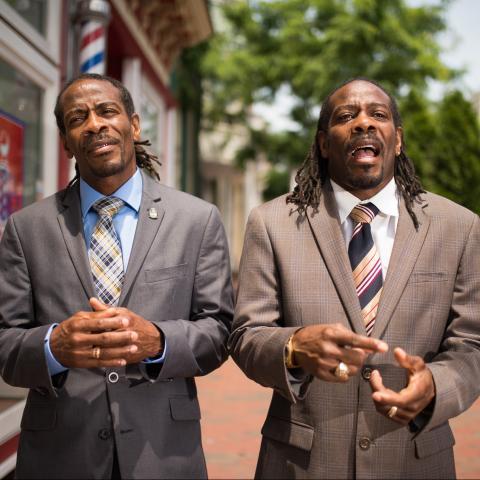This post appears courtesy of New Market Wilm, who features a new blog about Downtown Wilmington each and every Wednesday! View the original post here.
Nnamdi Chukwuocha and Albert Mills shared a womb, shared a creative calling and now share the title of 17th Poets Laureate of the State of Delaware. The Twin Poets, born and raised in Wilmington, have held a finger to the pulse of the city their entire lives, and their poetry beats to its rhythm…
WHY I WRITE (excerpt)
I write for the youth
Who never laid in the grass and looked up at the clouds
For youth who hide on the inside
When the teacher asks for volunteers to read out aloud
I write for youth who ain’t never even looked up at the clouds
Without expecting to feel rain
I write for lil girls who must double dutch near bloodstains
And don’t’ know their father’s name
I write to show the youth
That there are far more important things to think and talk about
Than the beef between nas/jay z or when the new jordans coming out
(Really, you should hear the whole thing. Which you can do here, at the 2:54 mark.)
A look at the past, present and future of a Wilmington with the Twin Poets:
The PAST
The Center for African-American Heritage at the Delaware History Museum on Market features the Twin Poets prominently in its literary section.
Nnamdi: “I just thought it was phenomenal, the idea of it. You think about literary icons … Miss Bebe Coker, Miss Dunbar-Nelson, so many others … and to go there and see your work next to them – along with the first African American poet to ever publish in your state – that’s just phenomenal. It’s a great hallmark and tribute to a legacy that we’re a part of and hopefully will continue and pass forward to the next generation, which is one of our ultimate goals.”
The PRESENT
Albert and Nnamdi regularly conduct literary workshops in places like the Delaware Historical Society and Wilmington Public Library to show young people the power of their voices.
Nnamdi: “A lot of it is providing a voice – particularly to communities of need – a voice where individuals can speak about the challenges within their communities and realize that they’re not just hapless victims, that they can say and they can do something. They can use their art, the can use their writing, they can use their voice to bring about change in various ways. And that’s what the writing process is about. Once you write something, it no longer belongs to you. It’s a gift you’re giving to the world. Some may love it. Some may hate it. But you’re giving it to individuals and that’s your gift, and whether they love it or hate it, hopefully they will be moved to understand your position, why you want to write it and why you want too bring forth some change.”
Albert: “I know a lot of what we’ve been doing with the children in the city has been around the effects of violence has had on them. The writing is giving them the opportunity to say things they might not otherwise be able to say. That’s a very important part.”
The FUTURE
The Twin Poets look toward what’s next for the city that they love.
Albert: “The movement that’s going on now with the arts in Wilmington is just amazing, and I just hope we continue to blossom into something beautiful, because there are so many talented artists in the area. For years, we’ve had to run to Philly, run to Baltimore, Jersey, New York, all these other places, and now we have these venues right around us where we can do our own murals and have our own plays. That opportunity is amazing.”
Nnamdi: “It’s filled with optimism and hope and obligation and duty to do our part, to make sure we’re not only do the work that’s needed to make our city and our community better, but also having that love for our city and having that love manifest itself not only in our work but also in our words as we go about our daily lives, knowing how important it is. If we value our city, if we value our art, it’s up to us to not allow others to devalue it. It’s up to us to stand up to it.”
Be sure to stop by the Delaware History Museum on Market Street to see the Center for African-American Heritage and learn more about the history of Wilmington and Delaware.


